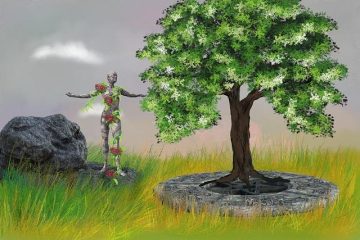In a world where ancient myths intertwine with modern science, the concept of Gaia emerges as a captivating enigma that bridges the realms of folklore and ecological wisdom. Delve into the essence of Gaia, a profound depiction of Earth as a living, breathing entity that sustains all life with an intricate balance of interconnected ecosystems. Join us on a journey to unravel the mysteries of Gaia, where myth and reality collide in a harmonious chorus of nature’s symphony.
Table of Contents
- Exploring the Concept of Gaia in Modern Environmental Science
- The Interconnected Web of Life: Understanding Gaia Theory
- Practical Ways to Embrace Gaia Philosophy in Everyday Life
- Q&A
- Final Thoughts

Exploring the Concept of Gaia in Modern Environmental Science
Explore the interconnectedness of all living beings with **Gaia**, a concept that highlights the planet Earth as a self-regulating organism. In the realm of modern environmental science, **Gaia** serves as a powerful metaphor for viewing Earth as a complex system where all components interact and influence each other.
Through the lens of **Gaia**, researchers delve into the intricate relationships between the atmosphere, oceans, land, and living organisms, emphasizing the delicate balance necessary for the sustainability of life on Earth. Understanding **Gaia** can lead to profound insights into the resilience and fragility of our planet, prompting us to reevaluate our role as stewards of this interconnected web of life.

The Interconnected Web of Life: Understanding Gaia Theory
In the vast tapestry of existence, Gaia theory weaves a narrative that portrays the Earth as a living, interconnected entity where all life forms, from the smallest microorganisms to the grandest ecosystems, are intricately linked in a delicate balance. This theory, proposed by James Lovelock in the 1970s, suggests that the Earth functions as a self-regulating system, much like a living organism, where feedback mechanisms maintain the conditions necessary to support life.
Imagine a world where the oceans, forests, and atmosphere work in harmony, each playing a vital role in sustaining the delicate ecosystem we call Earth. The Gaia theory invites us to perceive our planet not just as a collection of separate components but as a unified entity where every organism, every interaction, and every element contributes to the overall well-being of the whole. By acknowledging the interconnectedness of all life forms, we gain a deeper appreciation for the intricate web of relationships that shape our world and underscore the importance of preserving this delicate balance for generations to come.
Practical Ways to Embrace Gaia Philosophy in Everyday Life
Incorporating Gaia philosophy into our daily routines can foster a deeper connection with the natural world. By consciously engaging with the principles of interconnectedness and respect for all living beings, we can honor the symbiotic relationship between humans and the planet we call home. One way to embrace Gaia philosophy is by practicing mindfulness during nature walks – taking time to observe, appreciate, and meditate on the beauty and wisdom of the earth. This can offer a sense of grounding and gratitude, enhancing our sense of belonging within the intricate web of life.
Another practical approach to living in alignment with Gaia philosophy is adopting sustainable habits that reduce our ecological footprint. Simple actions such as recycling, composting, and reducing single-use plastics can contribute to the preservation of the environment and support the delicate balance of ecosystems. Additionally, supporting local organic farmers and businesses that prioritize ethical and eco-friendly practices can help promote a more harmonious relationship between humanity and the planet. By making conscious choices in our everyday lives, we can embody the essence of Gaia philosophy and contribute to creating a more sustainable and interconnected world for future generations.
Q&A
Q: What is Gaia and its significance in modern culture?
A: Gaia, in Greek mythology, is the ancestral mother of all life, the primal Earth goddess. In modern culture, Gaia represents the interconnectedness of all living beings and the planet itself, emphasizing the importance of environmental awareness and sustainability.
Q: How is the concept of Gaia relevant to today’s environmental issues?
A: The concept of Gaia highlights the idea that the Earth functions as a single, self-regulating organism. It urges us to consider the impact of human activities on the planet and advocates for a harmonious relationship between humanity and nature to address pressing environmental concerns.
Q: What practices can individuals adopt to honor the principles of Gaia in their daily lives?
A: Individuals can honor the principles of Gaia by practicing sustainable living, such as reducing waste, conserving energy, supporting eco-friendly initiatives, and fostering a deep connection with nature. Simple actions like recycling, using reusable products, and supporting local organic farmers can all contribute to honoring Gaia’s teachings.
Q: How can the concept of Gaia inspire positive change on a global scale?
A: By embracing the concept of Gaia, societies can shift towards more holistic and mindful approaches to addressing environmental challenges. Recognizing the interdependence of all life forms can inspire cooperation, innovation, and policy changes that benefit both the planet and future generations.
Final Thoughts
As we conclude our journey through the intriguing realms of Gaia, the Earth goddess, we are reminded of the interconnectedness of all life on this beautiful planet. Let us carry the wisdom of Gaia in our hearts as we tread lightly upon the Earth, honoring and preserving the delicate balance of nature. May her eternal spirit guide us towards a future where harmony and sustainability reign supreme. Embrace the existence of Gaia in every sunrise, every breath of wind, and every blade of grass. Let us unite in our shared responsibility to cherish and protect our home, for Gaia’s legacy is the legacy of us all.



0 Comments